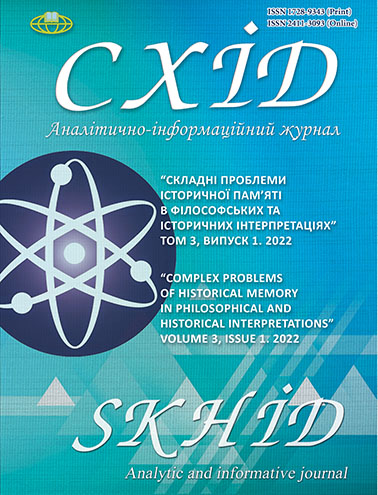Transformation of commemorative practices in Ukrainian historical discourse
DOI:
https://doi.org/10.21847/1728-9343.2022.3(1).253628Keywords:
social practices, commemoration, expert survey, historical memory, politics of memoryAbstract
The article is devoted to the study of changes taking place in Ukrainian society in the field of content of historical memory and forms of commemorative practices. The purpose of the study is to identify the main trends in transformations of the form and content of commemorative practices in the Ukrainian historical discourse. During the semi-structured, focused interview with 51 experts representing the main regions of Ukraine, it has been found that current commemorative practices are based on a symbiosis of monologue and dialogue models of memory. The remnants of the Soviet-style totalitarian worldview have led to the popularity of the model of memory, in which the state’s monopoly on history prevails. The idea that national memory consists of many particular commemorations is difficult for Ukrainian society to accept. The past is a kind of symbolic resource, the use of which contributes to the legitimization of Ukraine as an independent state. However, the forms of commemoration remain largely old. Along with fundamentally new forms, primarily related to Internet technologies and social networks, in Ukraine, just as in the Soviet period, commemoration is focused on honoring heroes and victims. At the same time, there is a radical reassessment: the heroes of the Soviet era have become villains, and villains have become heroes. All this points to the “hybrid nature” of commemorative practices with an emphasis on the martyrological-victim component and the trauma of the social psyche of Ukrainians.
Downloads
References
Connerton, P. (2004). Yak suspilstva pamʺyatayutʹ (transl.). Kyiv : Nika-Tsentr, 184 p. (In Ukrainian)
Halbwachs, M. (2007). Sotsialnyye ramki pamyati (translat.). Moscow: Novoye izdatelstvo, 348 p. (In Russian).
Kasyanov, H. (2007). Derzhavotvorchyy protses v Ukrayini 1991-2006. Politychnyy docvid samostiynoyi Ukrainy. Kyiv: Naukova dumka, 160-223. (In Ukrainian)
Korkuf, F. (2002). Novyye sotsiologii (translat.). Moscow-St.Petersburg : In-t eksperimentalnoy sotsiologii; Aleteyya. (In Russian)
Kyrydon, A. (2016). Heterotopiyi pamyati. Teoretyko-metodolohichni problemy studiy pamyati. Kyiv: Nyka-Tsentr, 2016. 320 p. (In Ukrainian)
Nahorna, L. (2014). Istorychna pamyat: teoriyi, dyskursy, refleksiyi. Kyiv, IF Kuras Institute for Political and Ethnonational Studies of the National Academy of Sciences of Ukraine. 328 p. (In Ukrainian)
Popov, B.V. & Fadyeyev, V.B., & Nosova, H.Yu., Bahinskyy, V.V., Nelha, O.V. (2007). Sotsialni praktyky v hlobalnomu vymiri. Kyiv, Naukova dumka, P.40 (In Ukrainian).
Skladni pytannia historychnoi pamyati v paradygmi kulturnogo dialogu (2019). Białystok: Białoruskie Towarzystwo Historyczne, 2019. 292 s. (In Ukranian).
Downloads
Published
How to Cite
Issue
Section
License
Copyright (c) 2022 Roman Dodonov

This work is licensed under a Creative Commons Attribution-NonCommercial-NoDerivatives 4.0 International License.
1. Authors bear responsibility for the accuracy of facts, quotations, numbers and names used.
2. Manuscripts are not sent back.
3. The publisher does not always agree with the authors' opinion.
4. The authors reserve the right to authorship of the work and pass the first publication right of this work to the journal under the terms of a Creative Commons Attribution-NonCommercial-NoDerivatives 4.0 International License. This license allows others to distribute (copy) the published work for non-commercial purposes, provided there is mandatory attribution to its authors and a link to the first publication in our journal.
5. The authors have the right to conclude separate supplement agreements that relate to non-exclusive work distribution in the form in which it has been published by the journal (for example, to upload the work to the online storage of the journal or publish it as part of a monograph), provided that the reference to the first publication of the work in this journal is included.

